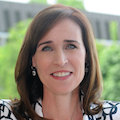People and Places: April 20, 2021
Transitions
 On July 1, Ed Grier becomes the new dean of Santa Clara University’s Leavey School of Business in California. Grier will join Leavey from Virginia Commonwealth University, where he has served as dean of the School of Business since 2010. At VCU, Grier oversaw the incorporation of the VCU Brandcenter and Center for Sport Leadership into the School of Business, the creation of an International Consulting Program for both master and undergraduate students, and the launch of the master of decision analytics professional track degree program. He joined VCU after a 29-year career with Walt Disney Company, where he served in a variety of roles including president of the Disneyland Resort in Anaheim, California.
On July 1, Ed Grier becomes the new dean of Santa Clara University’s Leavey School of Business in California. Grier will join Leavey from Virginia Commonwealth University, where he has served as dean of the School of Business since 2010. At VCU, Grier oversaw the incorporation of the VCU Brandcenter and Center for Sport Leadership into the School of Business, the creation of an International Consulting Program for both master and undergraduate students, and the launch of the master of decision analytics professional track degree program. He joined VCU after a 29-year career with Walt Disney Company, where he served in a variety of roles including president of the Disneyland Resort in Anaheim, California.
 Haina Zhang has been named the next head of the University of Aberdeen Business School in Scotland. Currently, Zhang is a chair in management and director of internationalization at the business school. She has held previous positions at the Lancaster University Management School in the U.K. and the University of Glasgow’s Adam Smith Business School in Scotland. She will assume her new role in August, taking over from Martin Meyer, who is moving to Finland to become vice rector of the University of Vaasa.
Haina Zhang has been named the next head of the University of Aberdeen Business School in Scotland. Currently, Zhang is a chair in management and director of internationalization at the business school. She has held previous positions at the Lancaster University Management School in the U.K. and the University of Glasgow’s Adam Smith Business School in Scotland. She will assume her new role in August, taking over from Martin Meyer, who is moving to Finland to become vice rector of the University of Vaasa.
As of June 7, Simon Mercado, currently dean of ESCP’s London campus, will become the school’s new executive vice president/directeur général adjoint for business and external relations. In that role, he will handle the school’s relations with corporate and institutional partners. As dean of executive education, he also will oversee the school’s part-time, executive, and customized programs.
Honors and Awards
 Christine M. Riordan, president of Adelphi University in Garden City, New York, has received the Council for Advancement and Support of Education (CASE) District II Chief Executive Leadership Award for her leadership during the pandemic. As trustee chair of New York’s Commission on Independent Colleges and Universities, Riordan convened a statewide Reopening Task Force to help public and private universities and colleges establish best practices for higher education in the face of COVID-19. The plan, which was presented to New York policymakers, became the template that colleges across the state used to form their reopening plans. Before being named Adelphi’s president in 2015, Riordan served as dean of the Daniels College of Business at the University of Denver and the provost of the University of Kentucky.
Christine M. Riordan, president of Adelphi University in Garden City, New York, has received the Council for Advancement and Support of Education (CASE) District II Chief Executive Leadership Award for her leadership during the pandemic. As trustee chair of New York’s Commission on Independent Colleges and Universities, Riordan convened a statewide Reopening Task Force to help public and private universities and colleges establish best practices for higher education in the face of COVID-19. The plan, which was presented to New York policymakers, became the template that colleges across the state used to form their reopening plans. Before being named Adelphi’s president in 2015, Riordan served as dean of the Daniels College of Business at the University of Denver and the provost of the University of Kentucky.
New Programs
Durham University in the U.K. will start a Master of Energy Systems Management program in September 2021. The one-year full-time program will be taught by Durham University Business School and department of engineering faculty, in partnership with the Durham Energy Institute. The program will cover topics such as the future of transportation, Net Zero challenges, and renewable energy technologies. The school plans to introduce a part-time and blended version of the program next year.
Adelphi University’s Willumstad School of Business in Garden City, New York, has introduced three advanced graduate certificate programs in business analytics, digital marketing, and marketing analytics. Applicants must hold bachelor’s degrees or higher in any disciplines. The new certificate programs have flexible course schedules that allow individuals to balance family and work obligations.
The University of South Florida (USF)—which has campuses in St. Petersburg, Tampa, and Sarasota-Manatee—has launched a new student internship program. Students who complete Business for Good internships will work directly with business leaders on the B Impact Assessment. The assessment prepares companies to apply for B Corp certification, under which companies are legally required to consider the impact of their decisions on their workers, customers, suppliers, community, and the environment through a verified third-party review. In the program’s pilot, more than two dozen students from the colleges of business, arts and sciences, and engineering, as well as students from the Patel College of Global Sustainability, will intern with seven businesses across various industries in Florida and Texas. The program will be run by the university’s Bishop Center for Ethical Leadership within USF’s Muma College of Business, in collaboration with the organizations B is for Benefit and Florida for Good.
Miami University in Oxford, Ohio, is rolling out two new online master’s programs that can be completed in as little as 10 months. The master’s in entrepreneurship and emerging technology program offers core courses that cover venture capital, the entrepreneurial mindset, business models, digital media design, digital branding, and interactive web programming. Community boot camps allow students to create startup pitches, build functioning mobile apps, or author white papers that review new applications. The program includes a one-week winter boot camp in Silicon Valley, internship/externship opportunities, and a graduate research project. The master of science degree in management is designed for nonbusiness majors who want to gain business knowledge and learn to solve problems creatively, think entrepreneurially, and make decisions ethically and analytically.
Collaborations
The University of Missouri in Columbia is collaborating with AT&T on an innovation lab that will bring full 5G+ millimeter wave capability to MU’s campus. The research and teaching space will allow the university and AT&T to share technology and help craft the future of 5G-enabled devices, including phones, drones, and autonomous devices. In a recent course on connectivity and 5G, students created proposals for the technology to be used in fields as diverse as healthcare and security. Another course in development will explore the potential of creating campus kiosks that use immersive technologies to reduce anxiety and improve mental health. The lab is the latest initiative from the University of Missouri Institute for Experiential Education, Innovation and Entrepreneurship, which brings together members from schools and colleges across the university to collaborate on knowledge sharing and entrepreneurship. The institute is housed in the department of management in the Trulaske College of Business.
This fall, the Cheung Kong Graduate School of Business (CKGSB) in Beijing and Johns Hopkins Carey Business School in Baltimore, Maryland, will launch a new dual degree master’s program. In the two-year, part-time, partially online program, students will earn both a Master of Science in Finance from Carey Business School and an MBA from CKGSB. Because the program uses asynchronous and real-time learning activities, it is suited for working professionals in China who are unable to study abroad due to COVID-19. A significant portion of the curriculum is devoted to the CFA Institute’s Candidate Body of Knowledge, which prepares students for the CFA exams.
NEOMA Business School in Nancy, France has signed a new global partnership with IRIS Sup’, the school of the French Institute for International and Strategic Affairs, which specializes in geopolitical and strategic issues. The partnership will provide students with courses built around topics such as geo-economics, risk management, defense, security, and crisis management. At NEOMA, students will study how business works; at IRIS, they will develop their ability to monitor, analyze, and make decisions in complex international environments.
Grants and Donations
Southern Methodist University’s Cox School of Business in Dallas has received a 15 million USD commitment from Sharoll and Bryan S. Sheffield. The gift will establish Bryan S. Sheffield Hall, which will serve as the hub for the school’s BBA program. The new building also will provide a home for the Brierly Institute of Customer Engagement, which brings together students, marketing faculty, and corporate leaders to explore why customers engage with brands. Bryan Sheffield is founder and managing partner of the private equity firm Formentera Partners.
Arizona State University has received an 8 million USD grant from the U.S. Department of Labor to lead a workforce development partnership to help train workers for high-demand jobs in manufacturing, cybersecurity, and technology. The One Workforce grant will establish the Arizona Workforce Training Accelerator Partnership for Next Generation Jobs (AZNext), which is designed to train at least 2,000 participants. The grant was a collaboration among ASU’s W.P. Carey School of Business and schools of engineering and arts and sciences. Overall, the Department of Labor’s One Workforce grant program will invest 146 million USD in upskilling the workforce. The money will go to state development agencies, targeted cities and counties, and other educational institutions, including Clark University in Massachusetts, Grand Rapids Community College in Michigan, Clark State Community College in Ohio, and Dallas College.
The University of Wisconsin–Milwaukee Lubar School of Business has received a 1 million USD gift for its investment management program. The gift, which endows the Elfe Family Business Fund, will enable students to gain hands-on experience managing an investment portfolio. The annual earnings allocations will support the investment program while also funding scholarships for nursing students at the university. The donation was made by Denise Elfe in memory of her husband Gary Elfe, both alums of the university. Gary Elfe, who was co-founder of Baird Advisors, developed a personal connection to UWM’s College of Nursing program as he battled Parkinson’s disease.
New Centers and Facilities
Sasin School of Management in Bangkok has opened its newly renovated space on the first and second floors of the school’s main building. The participant-oriented facilities include workshop areas, a commons, a café, and large gathering spaces, as well as the Sasin Sustainability and Entrepreneurship Center. The renovation was made possible by a donation from an anonymous alumnus.
New Research
There are major gaps in college accounting education today, with fewer than half of all programs teaching emerging topics such as IT governance and cybersecurity, according to a new report from the American Institute of CPAs (AICPA) and the National Association of State Boards of Accountancy (NASBA). While more than 60 percent of collegiate accounting programs are teaching topics like data analytics and IT audit, fewer programs cover cybersecurity, predictive analytics, or system and organization controls.
The report, which includes responses from more than 300 collegiate accounting programs, was intended to provide a broad picture of how accounting programs have incorporated new technology and other critical skills into their current curricula. These skills will become particularly important as AICPA and NASBA advance their CPA Evolution initiative, which is intended to transform the CPA licensure model to better recognize the rapidly changing competencies and technology knowledge required of CPAs. These skills will be reflected in the new Uniform CPA Exam in 2024. AICPA has developed resources to help collegiate accounting programs enhance their curricula as the profession transitions under the new CPA Evolution licensure model.
Racial inequity in the United States was the subject of a recent three-day workshop hosted by the Albert Lepage Center for Entrepreneurship and Innovation at Tulane University’s Freeman School of Business in New Orleans. Count the Costs Research Weekend was inspired by findings from a 2020 survey conducted by the LePage Center, which found significant disparities between businesses owned by people who are white and businesses owned by people who are BIPOC (Black, Indigenous and People of Color).
Scholars from various academic disciplines were invited to develop research proposals that investigate the barriers that BIPOC people experience in the U.S., the economic impact of those barriers, and viable approaches to addressing them. Participants can use their proposals to apply for research grants to be awarded from a funding pool of 100,000 USD. Proposals covered a wide range of topics, from the social psychology of urban monuments to the emotional and economic costs of historical trauma.
Other News
In March, Section4, a business upskilling platform, announced that it had secured a total of 37 million USD in funding. Launched in 2019 by entrepreneur Scott Galloway, a professor at New York University’s Stern School of Business, Section4 has the goal of “democratizing elite business education” by making programming accessible and affordable. The platform has received funding from companies such as General Catalyst, Learn Capital, and GSV Ventures; and from individuals such as Jeff Bewkes and Tim Armstrong, former CEOs of Time Warner and AOL, respectively. Section4 has also announced the expansion of its faculty with professors from NYU Stern, Northwestern University’s Kellogg School of Management, Stanford University, and the Haas School of Business at the University of California Berkeley.
The platform’s online courses are delivered as intensive, immediately applicable “sprints” organized into “stacks” that cover functional disciplines such as strategy, marketing, and product management. In the past 12 months, Section4 has enrolled more than 10,000 students in nearly 100 countries. According to Galloway, “The Section4 platform was created to offer millions, versus thousands, of aspiring professionals the opportunity to learn from the world’s premier business school instructors at a fraction of the cost and friction of the traditional MBA.”
Bentley University in Waltham, Massachusetts, has been named part of the 2021–22 First-gen Forward cohort, a group of colleges and universities that have demonstrated dedication to improving the experiences and advancing the outcomes of first-generation college students. Bentley was recognized in part because of its FirstGen Presidential Fellows program, which offers high-ability first-generation students full scholarships plus mentoring, networking, and career development throughout their four years at the school. The university also maintains the First-Gen Student Support Committee, whose mission is to create a community of academic and social support that engages and empowers first-generation students. The First-gen Forward designation is given by The Center for First-generation Student Success, an initiative of NASPA–Student Affairs Administrators in Higher Education and The Suder Foundation.
If you have news of interest to share with the business education community, please send press releases, relevant images, or other information to AACSB Insights at [email protected].






